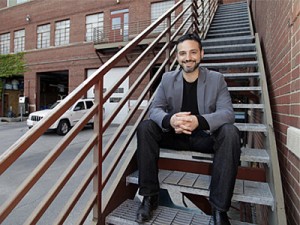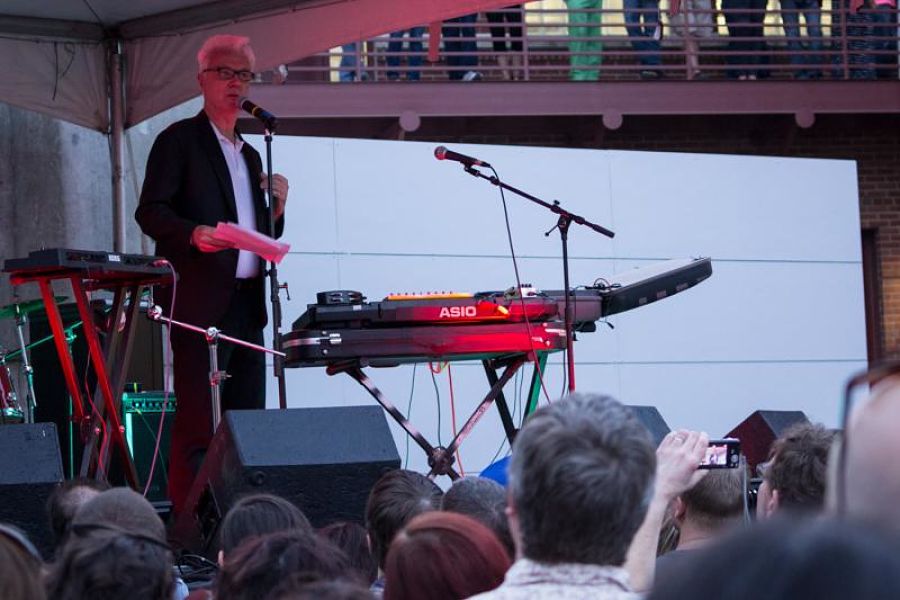DES MOINES, IOWA: As the summer of 2007 rolled around, Zack Mannheimer found himself at a crossroads. For seven years, he’d been artistic director of Brooklyn’s Subjective Theatre Company, whose mission was described as “producing a wide range of politically and socially relevant theatre and presenting it at no cost to the public.” The company’s mission statement went on to say that the company intended to “create work that consistently challenges and entertains our audience while inspiring creativity and social responsibility within our community.”
But Mannheimer was finding that goal increasingly difficult to attain, and for a possibly surprising reason.
“There can be no real discourse and debate when everyone you surround yourself with on a daily basis tends to agree with your positions on whatever issue,” Mannheimer says. “My main problem with creating art for an audience in [New York City] is that the majority of the people I create art with and those who come to see it agree with my viewpoints before they even walk in the door to create or to witness the creation. I am helping to provide reassurance to these people; I am not challenging them on an intellectual level or a primal level. Art creation has, for me, become nothing more than masturbation. My company and I have enjoyed many successes, good reviews, a loyal audience, and so on. But no change in what we preach is occurring.”
So on June 1 of that year, Mannheimer set out on a cross-country tour of the United States in search of a new place to open a theatre and a restaurant. His criteria for the town where he would settle were:
- 500,000 population in the metro area
- A downtown that needed to be revitalized
- Issues with the retention and recruitment of young people
- An arts scene that was burgeoning but not yet established
He had 18 small cities in mind: Pittsburgh; Indianapolis; Des Moines, Iowa; Sioux Falls, S.D.; Butte, Mont.; Missoula, Mont.; Boise, Idaho; Salt Lake City; Denver; Colorado Springs, Colo.; Omaha, Neb.; Lincoln, Neb.; Lawrence, Kan.; Wichita, Kan.; Tulsa, Okla.; Little Rock, Ark.; Nashville, Tenn.; and Raleigh, N.C. So that others could follow, and perhaps be inspired by, his quest, Mannheimer kept an on-line journal to record his impressions in real time.

On July 31, he reached his last few bucks and his final destination, Raleigh. His plan then was to head back to New York, wrap up a few details, celebrate his 30th birthday, then make the move to the city he’d felt most excited about. He decided on Des Moines and arrived in October, 2007, knowing no one and with $100 in his pocket.
The first thing Mannheimer did when he got there was get a job as a sommelier at an expensive private club where he could get to know the Des Moines elite who might be inclined to support his nascent organization. At the same time, he met artists in Des Moines to find out who they were and what they wanted to do. The biggest hurdle, naturally, was money.
“I was selling an untested product in a city where I was a foreigner during the biggest economic meltdown of my lifetime,” Mannheimer recalls. But after some hustling, he received a grant from the state’s Cultural Affairs Department that was enough to pay him and one other person, so he quit his job curating fine wine and got moving.
His first fundraising adventure occurred when he “weaseled my way in” to a meeting with Nationwide Insurance, which has regional headquarters in Des Moines. He waltzed in wearing ripped jeans and a pair of flip-flops—his normal New York City garb—and promptly asked them for $1.5 million. “They were so shocked,” he remembers, “that they didn’t laugh me out of the room, because they had never met anyone quite like me.” He didn’t get the money, but he did get their attention, and Nationwide later became a supporter.
Now, after eight years laying the groundwork and winning converts to his vision, Mannheimer is the executive director of Des Moines Social Club (DMSC), an arts and entertainment venue located in downtown Des Moines in an historic Art Deco firehouse Mannheimer had renovated for $8 million. It opened a year ago, with an opening address and performance by David Byrne for more than 4,000 people. DMSC, Manneheimer says, “provides a home for local artists, offers unique programming spanning all arts disciplines, and brings people of every age and background together under one roof—all for the purpose to use the arts as a catalyst to create unprecedented community engagement.”
If Mannheimer set out from Brooklyn with a desire to escape a homogeneous audience, he seems to have found what we was looking for. He recalls an experience from when DMSC was just starting out. He was approached by a group who produced WWE-type wrestling events who wanted to rent space.
“It wasn’t exactly the type of stuff I had thought of for DMSC,” Mannheimer admits now. “But they had money, so…” On the same night, in another part of the building, he booked a poetry-and-jazz event. “The audiences couldn’t have been more different, as you might imagine,” Mannheimer remembers, and not surprisingly, they did not mix.
But a month later, Mannheimer spotted a few of the wrestlers hanging out at the back of the poetry performance, listening intently. He immediately went up to them to talk; looking around nervously, the wrestlers confessed that they were poets themselves, and wondered whether they might be able to share a few of their poems in between matches. Mannheimer eagerly agreed. Soon some of the wrestling fans were coming to hear their favorite wrestlers read poetry—and in turn some of the poetry fans started going to wrestling matches to see their favorite poets wrestle. Conversations started happening between these groups of unlikely spectators, and a popular event was born.

These were exactly the sort of crossover conversations Mannheimer had dreamt of back in his Brooklyn days. Today, according to the DMSC website, “On any given night at the Des Moines Social Club, you may see thought-provoking theatre, pop-up art galleries, circus classes, entertaining trivia competitions, live music, or art courses for kids—all happening simultaneously. There’s something for everyone at the Des Moines Social Club.”
Now that the primary election season has arrived and Iowa is again in its unique quadrennial position under the political Klieg lights, DMSC is hosting voter registration nights and debates, along with everything else that is happening. As a side project, Mannheimer has created a few food trucks to make downtown Des Moines even hipper. Oh, and somewhere during the intervening years, he also got married and had three children.
A few months ago, Mannheimer surprised everybody by announcing he would be stepping down as executive director of DMSC at the end of the year.
“It’s been eight years, and [the club] needs some new blood,” Mannheimer told the Business Record. “But if I’m going to hand it off to someone else, I want to do it when we’re doing well…It’s not for lack of ideas, but we need to keep pushing the envelope.”
Privately, Mannheimer admits that he loves starting things up, but that once they are up and running he starts looking for something new to do. Another cross-country trip? No, he says he plans to stay in Des Moines but has yet to decide what his next project will be. (The filing deadline for a presidential candidates isn’t until next February—you heard it here first.) DSMC has done a national search for his replacement, and an announcement is expected soon.
And what effect has Mannheimer’s experiment in place-making had on Des Moines?
“I see a lot more civility—people having real, honest conversations,” Mannheimer says. “I wouldn’t say it was entirely because of DMSC, but we played a part. Hey, if you can get fans of wrestling and poetry to talk, you can get anybody to talk!”
Scott Walters writes the “Interrobang?!” column at the Clyde Fitch Report, and the “Creative Insubordination” column at Arts Journal. He is a professor of Drama at the University of North Carolina at Asheville.


